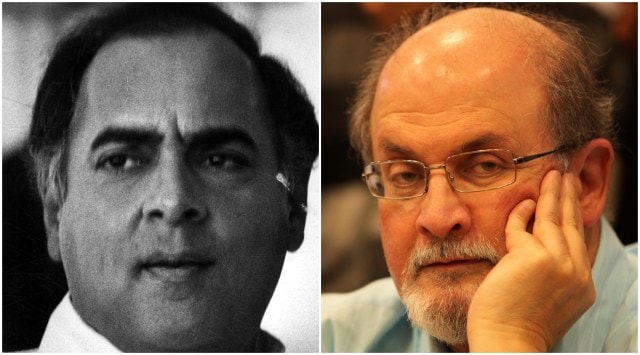- India
- International
‘This is no way for a free society to behave’: Salman Rushdie wrote to Rajiv Gandhi after ban on ‘The Satanic Verses’
In his letter to Rajiv Gandhi, Salman Rushdie had asserted that the right to freedom of expression is at the foundation of any democratic society and said "Indian democracy was becoming something of a laughing stock."
 Former Indian Prime Minister late Rajiv Gandhi and novelist Salman Rushdie. (Express Archive)
Former Indian Prime Minister late Rajiv Gandhi and novelist Salman Rushdie. (Express Archive)Salman Rushdie, whose novel The Satanic Verses drew death threats from Iran’s leader in the 1980s, was stabbed in the neck and abdomen Friday by a man who rushed to the stage as the author was about to give a lecture in western New York. A bloodied Rushdie, 75, was flown to a hospital and underwent surgery. He is likely to lose an eye in the attack.
Ever since it came out in 1988, Rushdie’s The Satanic Verses has been one of the most controversial books in the world. After Muslims from across the globe began making a hue and cry about the book, alleging that it mocked their faith, various national governments, including the Indian government under Rajiv Gandhi, banned the import and sale of the work.
On learning about the Indian government’s decision, the author shot off a strongly-worded letter to the then Prime Minister Rajiv Gandhi.
The New York Times published a version of the letter on October 19, 1988, Section A, Page 27 of the National edition with the headline: ‘India Bans a Book For Its Own Good.’
In the letter, Rushdie expressed his exasperation over the government’s move to ban the book “after representations by two or three Muslim politicians, including Syed Shahabuddin and Khurshid Alam Khan, both members of Parliament.”

He further went on to say, “These persons, whom I do not hesitate to call extremists, even fundamentalists, have attacked me and my novel while stating that they had no need actually to read it. That the Government should have given in to such figures is profoundly disturbing.”
Mentioning that an official statement explained that The Satanic Verses had been banned as a pre-emptive measure as certain passages had been identified as susceptible to distortion and misuse, he stated: “This really is astounding. It is as though, having identified an innocent person as a likely target for assault by muggers or rapists, you were to put that person in jail for protection. This is no way, Mr. Gandhi, for a free society to behave.”
“Clearly, your government is feeling a little ashamed of itself and, sir, it has much to be ashamed about. It is not for nothing that just about every leading Indian newspaper and magazine has deplored the ban as, for example, ”a Philistine decision” (The Hindu) or ”thought control” (Indian Express),” he added.
He also pointed out that many people around the world would find it strange that it is the finance ministry that got to decide what Indian readers may or may not read. Rushdie further took a swipe at the ministry by quoting from news agency PTI’s report – “the ban did not detract from the literary and artistic merit of Rushdie’s work,” by responding: “Thanks for the good review.”
He further asserted that the right to freedom of expression is at the foundation of any democratic society, “and at present, all over the world, Indian democracy is becoming something of a laughing stock.”
In the letter, he also tried to give explanations for a few portions in the book that went on to kick up a controversy.
“The section of the book in question (and let’s remember that the book isn’t actually about Islam, but about migration, metamorphosis, divided selves, love, death, London and Bombay) deals with a prophet – who is not called Mohammed – living in a highly fantastical city made of sand (it dissolves when water falls upon it). He is surrounded by fictional followers, one of whom happens to bear my own first name. Moreover, this entire sequence happens in a dream, the fictional dream of a fictional character, an Indian movie star, and one who is losing his mind, at that. How much further from history could one get?” he asked.
Rushdie also slammed the government saying, “From where I sit, Mr. Gandhi, it looks very much as if your Government has become unable or unwilling to resist pressure from more or less any extremist religious grouping; that, in short, it’s the fundamentalists who now control the political agenda.”
“I deeply resent my book being used as a political football; what should matter to you more than my resentment is that you come out of this looking not only Philistine and anti-democratic but opportunistic,” the author added.
He ended the letter by stating: “Your action in the matter of ”The Satanic Verses” will be an important indicator for many people around the world. If you confirm the ban, I’m afraid I, and many others, will have to assume the worst. If, on the other hand, you should admit your government’s error and move swiftly to correct it, I will be the first to applaud your honorable deed.”
Apr 26: Latest News
- 01
- 02
- 03
- 04
- 05






























